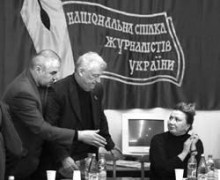“I’m not going to name the newspaper only because this is not the first nor the last instance of this kind” — declared one Kyiv journalist, commenting on the European Court of Human Rights ruling of March 29, in which the court found Ukraine guilty of infringing freedom of speech after considering a lawsuit from the Ukrainian Press Group, the publishers of Den/The Day. The European Court confirmed by this decision that journalists’ value judgments, unlike distortion of facts, are not subject to prosecution and that politicians should be prepared for scathing criticism in the media. This ruling, made on the basis of common European norms, is the first of its kind for Ukraine. Yet, the journalist who was too “embarrassed” to name Den/The Day was not aware of this for some reason.
Participants of a workshop organized by the National League of Ukrainian Journalists for the regional mass media interpreted the European Court ruling as a benchmark for all Ukrainian media. Addressing the forum on April 22, Den/The Day’s editor-in-chief Larysa Ivshyna expressed the hope that the stand taken by Deputy Minister of Justice Valeriya Lutkivska (who said on April 12 at a League press conference that this ruling was of great importance for Ukraine’s legislation and court practice) would be the official position and that the Ministry of Justice will not be lodging an appeal.
It is now no longer in doubt that this provision may be applicable to present-day Ukraine. A considerable part of the workshop was devoted to “misunderstandings” that have appeared in the new government’s activities. Taking advantage of the presence of Mykhailo Doroshenko, editor of Ukrayina moloda and part-time advisor to the president for informational policies, Ms. Ivshyna urged the government to publicly respond to major problems that are accumulating in the informational field. She gave several examples of the government’s lack of reaction. Academician Valery Stepankov recently published an article entitled “The Specter of Hong Weibingism [Chinese Red Guardism]” in Den, No. 39, which dealt with the attempts to dismiss the rectors of some universities (they were held responsible for the previous government’s methods of rule) with the help of revolutionary-minded youth: none of the new administration’s officials have commented on this. The Internet made public ten questions from Oleksandr Elyashkevych, one of which was whether it was true that Boris Berezovsky was promised Ukrtelecom, 1+1 TV channel, and other businesses as a reward for his assistance in the elections. Lawyer Andriy Fedur and others talked about “black lists” in Donetsk oblast. Mr. Doroshenko agreed that governmental officials must react to such things and made it clear that he would do his bit. Whatever the case, the exposure of politicians to criticism by the mass media is always going to be a burning issue.
COMMENTARIES
Oksana ZBITNEVA, editor of Teleexpress, Komsomolsk, Poltava oblast:
“The news that the European Court upheld the complaint of the newspaper Den/The Day is a cause for joy because it is a genuine breakthrough. For me personally, as a representative of regional media, this is also a strong platform that will help us defend our interests and make it clear to the authorities that the media are not to be tampered with, if, of course, the media themselves take a firm stand. I think Ukrainian society should be proud of this decision.”
Iryna KHROMENKO, executive secretary, Nova doba, Cherkasy:
“I think the European Court’s ruling will be a reference point for all the Ukrainian media, an example of how they can defend their rights within the framework of the law. Yet, it will be more difficult to apply this practice on the regional level. Firstly, not all newspapers can afford to hire lawyers. Secondly, it is often very difficult to defend one’s rights in regional courts: judges, who have been dealing with the same publication for years on end, often have a prejudiced attitude to it. This means it is high time for a judicial reform. Still, if there is a precedent, we stand a good chance of a fair decision.”
Eduard ZALUSKY, Volodymyr vechirniy, Volodymyr-Volynsky, Volyn oblast:
“I would like to agree with Larysa Ivshyna that, before declaring that we are going to Europe, etc., first we must see in real life some practical steps in this direction. For example, in this particular case it is important to see the way the provision — that a journalist can be prosecuted for distortion of facts, not for value judgments — will be enforced in practice. What is important is not the amount of damages paid to the newspaper but the very fact that the state will be taking a cautious approach because of this ruling. And perhaps we, the representatives of small regional newspapers, will take this practice into account if somebody tries to stifle us, i.e., we’ll be defending our rights. So, it was worthwhile attending the workshop just to hear this speech.”







